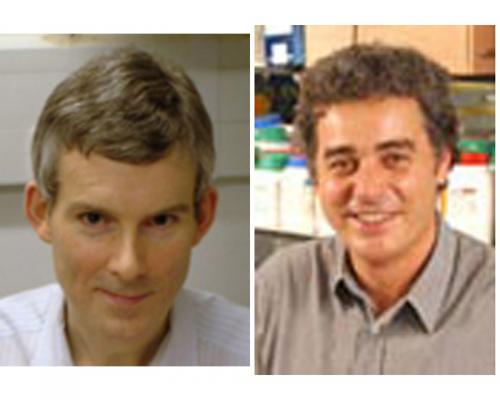
Two former members of the School of Life Sciences elected Fellows of the Royal Society of London
Peter Parker who was a postdoctoral fellow in Philip Cohen's lab from 1980-1983 and David Barford, who worked in Tricia Cohen's lab in 1990-1991 have just been elected Fellows of the Royal Society of London.
Peter is currently Head of the Signal Transduction Laboratory at the Institute of Cancer Research, London, while David is a Programme Leader at the Institute for Cancer Research.
Peter Parker has made many important discoveries in the field of cell signalling. These include major contributions to our understanding of protein kinase C, such as its identification as the major receptor for tumour promoting phorbol esters,the domains that bind both phorbol esters and diacylglycerol;also, the identification and characterisation of multiple PKC isoforms, how they are regulated and some of their physiological roles. He was the first to purify and characterise the Class 1 PI/3-kinases in collaboration with Mike Waterfield and is credited with the discovery of the second messenger PI(3,5)P2. He is a co-founder of the biotechnology company PIramed.
David Barford is one of the UK 's leading X-ray crystallographers. With Louise Johnson he determined the three-dimensional structures of the active and inactive forms of glycogen phosphorylase, providing the first molecular explanation for how phosphorylation of a protein can alter its activity. He solved the structures of all the three major classes of protein phosphatases encoded by the human genome which included the first structure of a PDZ domain to be elucidated. More recently he solved the structures of protein kinase B and B-Raf, two of the most important targets for anti-cancer drugs (point mutations in B-Raf are the cause of 70% of malignant skin cancers). His studies have given important insights into the regulation of these key enzymes.
Only 40 people from the United Kingdom and the British Commonwealth are elected to the Fellowship of the Royal Society each year in all branches of science (Mathematics, Physics, Chemistry, Astronomy and Geology as well as all biological and medical subjects).
Peter is currently Head of the Signal Transduction Laboratory at the Institute of Cancer Research, London, while David is a Programme Leader at the Institute for Cancer Research.
Peter Parker has made many important discoveries in the field of cell signalling. These include major contributions to our understanding of protein kinase C, such as its identification as the major receptor for tumour promoting phorbol esters,the domains that bind both phorbol esters and diacylglycerol;also, the identification and characterisation of multiple PKC isoforms, how they are regulated and some of their physiological roles. He was the first to purify and characterise the Class 1 PI/3-kinases in collaboration with Mike Waterfield and is credited with the discovery of the second messenger PI(3,5)P2. He is a co-founder of the biotechnology company PIramed.
David Barford is one of the UK 's leading X-ray crystallographers. With Louise Johnson he determined the three-dimensional structures of the active and inactive forms of glycogen phosphorylase, providing the first molecular explanation for how phosphorylation of a protein can alter its activity. He solved the structures of all the three major classes of protein phosphatases encoded by the human genome which included the first structure of a PDZ domain to be elucidated. More recently he solved the structures of protein kinase B and B-Raf, two of the most important targets for anti-cancer drugs (point mutations in B-Raf are the cause of 70% of malignant skin cancers). His studies have given important insights into the regulation of these key enzymes.
Only 40 people from the United Kingdom and the British Commonwealth are elected to the Fellowship of the Royal Society each year in all branches of science (Mathematics, Physics, Chemistry, Astronomy and Geology as well as all biological and medical subjects).

